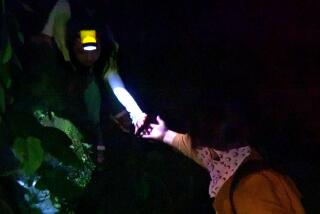Documentary subjects have 7-year hitch
- Share via
WHEN it first aired on British television in 1964, the concept behind “7 Up” seemed almost unfathomable: Interview 14 British schoolchildren about their hopes, dreams, fears and favorite vegetables in an effort to give the public a glimpse of what the workforce would look like in the far-off year of -- gasp -- 2000.
It was an immediate hit with the public, and director Michael Apted’s cameras have returned at seven-year intervals ever since (“14 Up,” “21 Up,” and so on) to create a landmark documentary series more real than anything on reality TV. “49 Up,” due out Oct. 6, is perhaps the most poignant installment as it finds its subjects at the half-century point.
The documentary includes riveting footage of the men and women from all walks discussing their lives in an almost matter-of-fact fashion: Dalliances are revealed, divorces and marital strife are hashed over, mental and physical illnesses are acknowledged, and several participants seem to reconcile themselves to the lifelong dreams that have slipped away. Then there are folks such as Tony, who struggled to find his footing as a young man but is now a successful businessman, weekend golfer and doting granddad. Bruce, a former teacher who had recalled tear-filled days as a youngster in boarding school, reflects on his surprise at how happy his life has turned out.
What is perhaps most palpable is the resentment that many of the subjects feel about their participation in the presumably lifelong project.
Several of the individuals who were volunteered as youngsters for the project have since dropped out -- apparently unwilling or unable to deal with the emotionally draining interviews and the public scrutiny that inevitably follows the release of each new installment. (Tony, for one, acknowledges that the public will be outraged by his comments about how the complexion of London has changed too much for his tastes, because he is a “traditionalist” who prefers to live among “my own people.”)
At one point, Jackie, a mother who has struggled with rheumatoid arthritis, jousts with Apted over the questions he asks and accuses him of editing her interviews to show her in an unflattering light. She, like others, talks about the intrusion posed by the cameras and a public that feels free to pass judgment on how they’re living their lives. Another woman announced that this will be her last appearance as part of the project. Contemplating “however many million people picking over my life,” Suzy, a homemaker, says, “people seem to read into what they think we think.”
Others seem to grapple with questions of whether the series contributes to society in some way, even as they seem reluctant to shut that door on creating a living, breathing scrapbook of their lives.
*
More to Read
The complete guide to home viewing
Get Screen Gab for everything about the TV shows and streaming movies everyone’s talking about.
You may occasionally receive promotional content from the Los Angeles Times.







